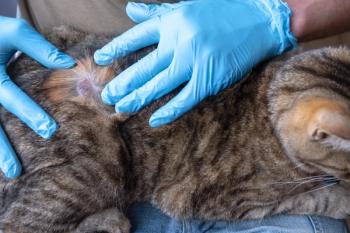
Secret shopper spots practice liabilities
Santa Ana, Calif.-Robert Newman knows his Chihuahua suffers a slight heart murmur. Yet instead of informing his new veterinarian of the previously diagnosed condition, he waits to see test results, occasionally entertaining treatment recommendations he knows the dog doesn't need.
Santa Ana, Calif.-Robert Newman knows his Chihuahua suffers a slight heart murmur. Yet instead of informing his new veterinarian of the previously diagnosed condition, he waits to see test results, occasionally entertaining treatment recommendations he knows the dog doesn't need.
That's because Newman isn't there for medical advice. He's a hired gun, secret shopping practices in search of liabilities. The attorney who's made his living suing California veterinarians in malpractice cases now works for the other side, protecting practices against potential legal claims.
"I've had vets tell me we need to do an MRI of the dog's chest and say he has a collapsed trachea," he says. "I act concerned and ask what it means. For that moment, the veterinarian doesn't suspect a thing."
Newman admits the tactic might seem underhanded, and veterinarians selling needless procedures are few and far between. Sales incentive programs common in specialty referral clinics are likely to increase dishonesty, he says.
"As an ethical veterinarian, a full range of diagnostics is important," Newman says. "But there's a difference between diagnostics and a veterinarian telling me my dog needs surgery for a fractured back when I know the dog doesn't even have a real limp."
Practice owners don't just hire Newman to secret shop. He also identifies silent liabilities known to heighten a practice's vulnerability.
Safeguard measures
"My job is to say, 'Here's where your legal liability stands. Here's where you're most likely to get sued,'" Newman says. "That's what every practice is interested in, as they should be."
It's impossible to have a perfectly safeguarded practice; records keeping, client communication and staff training are known to be common weak areas, Newman adds.
"Owners have to watch their practices close because the type of consumer nowadays is Internet savvy, which makes for much more problematic clientele," he says. "Veterinary medicine used to be an unchecked profession. Now you have clients researching diseases, watching your every move with a heightened awareness of what makes good veterinary services."
Newman keeps his clients confidential, but Dr. Pamela Cole, owner of two practices in Irvine, Calif., agreed to speak with DVM Newsmagazine.
Critiquing a practice
While Cole hasn't hired Newman to secret shop her practices, she has asked him to consult on risk management. In his first few hours at the clinic, he noted a list of liabilities stemming from deficient records keeping.
"I have 48 employees and five associates, so it's hard to know what everyone is doing," she says. "At the same time, it's certainly clear that litigation in veterinary medicine is on the upswing. The risk is there, that's why prevention is so important."
Newman usually spends a day or two observing the practice. He then schedules a staff meeting to chart issues, followed by a written report.
"There are nitpicky things I find in every practice, and of course, some have more serious problems than others," he says. "Veterinary medicine is a business. The only thing you need to get a lawsuit going is poor communication."
Newsletter
From exam room tips to practice management insights, get trusted veterinary news delivered straight to your inbox—subscribe to dvm360.




